|
|
|
Sort Order |
|
|
|
Items / Page
|
|
|
|
|
|
|
| Srl | Item |
| 1 |
ID:
070101
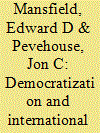

|
|
|
| 2 |
ID:
080979
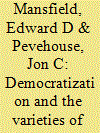

|
|
|
|
|
| Publication |
2008.
|
| Summary/Abstract |
Scholars of international relations have devoted remarkably little attention to the issue of why and when states enter international organizations (IOs). We argue that states have particular reason to enter IOs during the process of democratization. In the midst of a democratic transition, state leaders have difficulty making a credible commitment to sustain reforms, since they can benefit from rolling back liberalization. Gaining membership in an IO can enhance the credibility of leaders' commitments to democratic reforms. However, not all IOs are equally useful in this regard. We distinguish between IOs that cover standards in areas such as human rights and environmental protection, those that regulate economic activity, and those that are forums for addressing broad political problems. We argue that democratizing states have greater reason to join standards-based and economic IOs than political organizations. The results of a set of statistical tests support this argument
|
|
|
|
|
|
|
|
|
|
|
|
|
|
|
|
| 3 |
ID:
178573
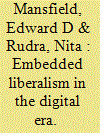

|
|
|
|
|
| Summary/Abstract |
In recent years, the volume and intensity of attacks on globalization have been steadily rising. It is frequently argued that the antiglobalization backlash stems from strains that have been placed on the compromise of embedded liberalism. We argue that existing research underemphasizes how technological change and the digital revolution have contributed to these strains. Global value chains facilitated by the digital revolution have linked technology in advanced industrial countries to low-cost labor in developing countries, precipitating distributional losses for low-skilled labor in the industrial world. Further, the digital revolution has led to regulatory challenges involving both capital and labor. We argue that, as a result, governments face both mounting opposition to globalization and heightened difficulty in supporting the programs and policies necessary to buffer the adverse domestic effects of globalization and maintain support for embedded liberalism.
|
|
|
|
|
|
|
|
|
|
|
|
|
|
|
|
| 4 |
ID:
123628
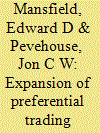

|
|
|
|
|
| Publication |
2013.
|
| Summary/Abstract |
The growing number of preferential trading arrangements (PTAs) since World War II has generated substantial interest in their economic and political effects. It has also prompted interest in the factors that give rise to PTAs, but very little research has been conducted on the growth of extant PTAs. To address this shortcoming, we analyze why some arrangements expand, whereas others do not. We find strong evidence that expansion is most likely when the existing members of a PTA display a high degree of trade openness and when the size distribution of these members is fairly uniform. We also find that PTAs that add new members are likely to do so again in the near future and that, throughout the global system, PTAs tend to expand in clusters. Equally, there is some indication that the market size of a PTA affects its odds of expansion. Finally, we investigate which states join enlarging PTAs. We find that PTAs expand by taking on new members that are economically and politically similar to existing members.
|
|
|
|
|
|
|
|
|
|
|
|
|
|
|
|
| 5 |
ID:
008836
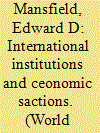

|
|
|
|
|
| Publication |
July 1995.
|
| Description |
575-605
|
|
|
|
|
|
|
|
|
|
|
|
|
|
|
|
| 6 |
ID:
139531


|
|
|
|
|
| Summary/Abstract |
In this paper, we provide one of the first systematic analyses of gender's effect on trade attitudes. We draw on a unique representative national survey of American workers that allows us to evaluate a variety of potential explanations for gender differences in attitudes toward free trade and open markets more generally. We find that existing explanations for the gender gap, most notably differences between men and women in economic knowledge and differing material self-interests, do not explain the gap. Rather, the gender difference in trade preferences and attitudes about open markets is due to less favorable attitudes toward competition among women, less willingness to relocate for jobs among women, and more isolationist non-economic foreign policy attitudes among women.
|
|
|
|
|
|
|
|
|
|
|
|
|
|
|
|
| 7 |
ID:
168549
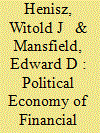

|
|
|
|
|
| Summary/Abstract |
Over the past three decades, numerous countries have engaged in financial reform, prompting widespread interest in the sources of this development. Virtually all of the studies conducted on this topic, however, have focused on explaining neoliberal policy adoption in the financial sector, without addressing whether the adopted reforms actually generate neoliberal economic outcomes. This gap in the literature is important because many policy reforms are not implemented or enforced. In this article, we conduct one of the first studies of the conditions under which de jure financial reforms are implemented, yielding de facto financial liberalization. We argue that democracy inhibits de facto financial reform when society at large is dissatisfied with government. Under these circumstances, democratic officials may be tempted to announce but not to follow through on financial policy liberalization or be unable to follow through, either fearing or facing opportunistic political opposition from legislative or partisan veto players who either represent or seek the electoral support of interest groups harmed by implementing financial reforms. Based on an analysis of ninety countries from 1980–2005 corroborated by a series of illustrative case studies, we find considerable support for this argument.
|
|
|
|
|
|
|
|
|
|
|
|
|
|
|
|
| 8 |
ID:
148027
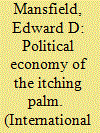

|
|
|
|
|
| Summary/Abstract |
In this paper, I conduct the first cross-national study of the political economy of gratuities. Existing efforts to explain cross-national variations in tipping either approach this topic from a social-psychological or an economic perspective. In contrast, I argue that the diffusion of American tipping norms contributes to cross-national tipping patterns and that visits by foreign travelers to the United States are the central path through which these norms spread overseas. Consistent with this argument, I find that non-immigrant admissions to the United States are strongly and positively linked to restaurant tipping rates. Further, increases in such admissions have spurred a rise in tipping rates. From the standpoint of the domestic political economy, various observers argue that patrons leave larger tips in poorer countries and countries marked by poor labor conditions. However, my results provide little indication that these factors directly bear on cross-national tipping patterns. Instead, the existence of a service charge constitutes the only domestic factor that directly affects tipping rates.
|
|
|
|
|
|
|
|
|
|
|
|
|
|
|
|
| 9 |
ID:
072025


|
|
|
| 10 |
ID:
134495
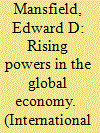

|
|
|
|
|
| Summary/Abstract |
Over the past 20 years, social scientists, government officials, and investors have expressed mounting interest in the BRIC countries, which include Brazil, Russia, India, and China.2 This acronym was originally coined in 2001 by a Goldman Sachs official who was concerned with the increasing role these countries were playing in global finance (Hounshell 2011). Recently, there has been a growing recognition that the effects of the BRICs on the global economy are not limited to finance. It is also clear that these countries are key political actors: all but one of them possess nuclear weapons, they are regional powers, and many observers view China as a potential challenger to the United States in global political-military affairs.
|
|
|
|
|
|
|
|
|
|
|
|
|
|
|
|
| 11 |
ID:
065813


|
|
|
| 12 |
ID:
090609
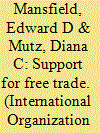

|
|
|
| 13 |
ID:
109938


|
|
|
|
|
| Publication |
2011.
|
| Summary/Abstract |
Bilateral investment treaties (BITs), agreements that provide extensive rights and protection to foreign investors, were first adopted in the 1960s, proliferated in the late 1980s and 1990s, especially among developing countries, and seemingly fell out of fashion after 2001. To explain this life cycle of diffusion across the international state system, we argue that BIT signing followed a traditional logic of diffusion for an innovation albeit here in the policy realm. In the first period, BITs provided a solution to the time inconsistency problem facing host governments and foreign investors. In the second period, these treaties became the global standard governing foreign investment. As the density of BITs among peer countries increased, more countries signed them in order to gain legitimacy and acceptance without a full understanding of their costs and competencies. More recently, as the potential legal liabilities involved in BIT signing have become more broadly understood, the pattern of adoption has reverted to a more competitive and rational logic. Our empirical tests of BIT signing over four decades provide evidence for such a three-stage model.
|
|
|
|
|
|
|
|
|
|
|
|
|
|
|
|
| 14 |
ID:
124865


|
|
|
|
|
| Publication |
2013.
|
| Summary/Abstract |
Economists have argued that outsourcing is another form of international trade. However, based on a representative national survey of Americans conducted in 2007 and 2009, the distribution of preferences on these two issues appears to be quite different. This article examines the origins of attitudes toward outsourcing, focusing on the extent to which it reflects (1) the economic vulnerabilities of individuals; (2) the information they receive about outsourcing, including their subjective understanding of what constitutes outsourcing; and (3) noneconomic attitudes toward foreign people and foreign countries. The findings emphasize the importance of variations in understandings of the term, as well as the highly symbolic nature of attitudes toward this issue. Individuals who believe the US should distance itself from international affairs more generally, who are nationalistic, or who feel that members of other ethnic and racial groups within the US are less praiseworthy than their own group tend to have particularly hostile reactions to outsourcing. The informational cues people receive are also important influences on their understanding of and attitudes toward outsourcing. Experimental results further emphasize the symbolic nature of attitudes toward outsourcing. Taken together, the results strongly suggest that attitudes are shaped less by the economic consequences of outsourcing than by a sense of "us" versus "them."
|
|
|
|
|
|
|
|
|
|
|
|
|
|
|
|
| 15 |
ID:
068979
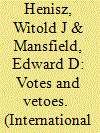

|
|
|
|
|
|
|
|